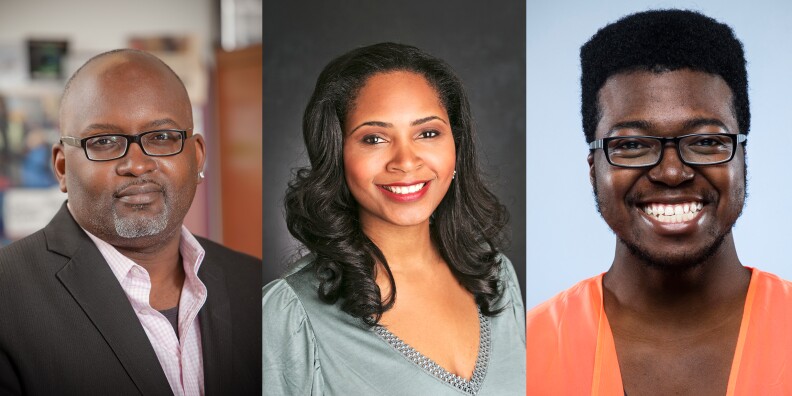The media has been flooded with stories castigating Hollywood for its perennial problems with a lack of racial diversity. But what about all the reporters writing those stories?
Many of them are white, too.
Take Two examined the racial diversity (or lack thereof) among entertainment reporters and critics.
Here are a few highlights from the roundtable discussion.
Eric Deggans, TV critic for NPR
I'm going to guess that all of you love what you do ... but we're not seeing a lot of people of color reporting on entertainment. Why do you think that is?
"It seems at every level, journalism organizations are struggling to match the diversity of the communities that they cover ... I think another problem is that a lot of journalism outlets are challenged economically, and so if you're a young person of color and you're smart and you have a lot of options open to you, do you go to work for a newspaper when the newspaper industry is declining? Do you go to work for a website that may not pay you or may pay you very little? I started my career at a time when you could get good paying jobs at newspapers and hone your skills as an arts critic and those pathways ... are almost gone. So, I think part of it is the decline of the media industry, and part of it is the fact that the news industry has always struggled to be diverse."
Alynda Wheat, senior writer at People Magazine
Is entertainment reporting somehow different from other fields of reporting when it comes to diversity?
"Well, in one particular way in that it is much harder to break into. People would ... rather report on Beyonce than they would on the NASDAQ or politics ... It's a fun field to be in and therefore it's incredibly competitive. Eric is right definitely about the economics. I think I am the only parent in my office who doesn't have either a stay-at-home partner or a nanny. That's a real economic challenge and one that's almost impossible for a lot of journalists of color to overcome -- and we are. We're still fighting to prove that we belong in the newsrooms, we're still fighting to get notice from the editors and people who do the hiring and it's a tough barrier."
Tre'vell Anderson, reporter for the LA Times
Tre'vell, you're in the LA Times newsroom. Is there this moment ... that they say, 'OK, here's this big film and it's 'Straight Outta Compton.' Do all eyes turn to you and say, 'Oh, I guess you're going to go,' and how does that make you feel?
"I think there are definitely moments where there seems to be a 'black movie' that's coming out that we think we need to cover and a number of people expect either me to be interested in doing it or they automatically assign it. Now, I will say that I am more -- often than not -- leaning toward and wanting to write about those particular movies. If it's a ... lower budget black film that we may not necessarily always focus on, I do want to give it some shine if I can. But, I will say that it has to be a 'Straight Outta Compton,' it has to be a 'Creed' for the other reporters who are all white to pipe up and say they want to cover it."
Guests:
- , reporter for the Los Angeles Times
- , senior writer at People Magazine
- , TV critic for NPR



